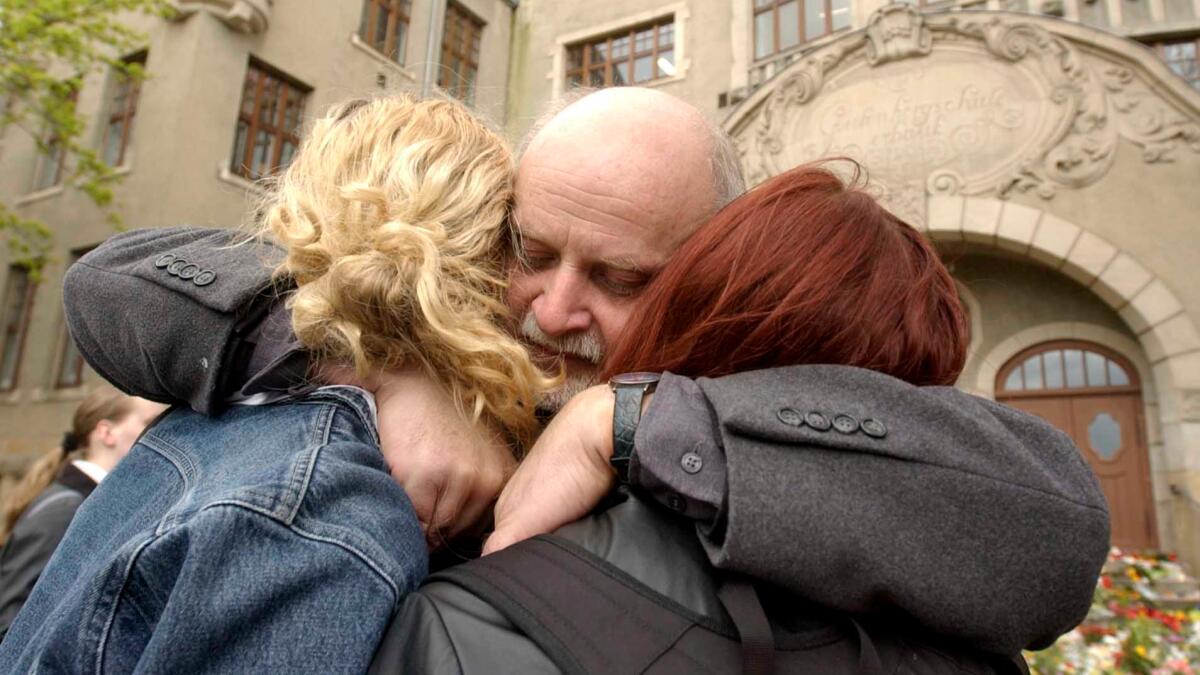Shootings dropped in Germany after gun control laws tightened

- Share via
Reporting from BERLIN — Tough gun control laws in Germany that were rigorously tightened after two ghastly school shootings in 2002 and 2009 have helped cut the number of firearm killings in half to about 50 a year, according to experts.
Germans are known to admire America and its freedoms, but they were horrified by the arrival of distinctly American-style school shootings in their backyard in Erfurt in 2002 and Winnenden in 2009. They have been equally as shocked by the shooting deaths by a lone gunman at a nightclub in Florida on Sunday and baffled by the United States’ inability to stop the scourge.
Germans so universally condemned the loss of life after Erfurt and Winnenden that there was nary any protest when lawmakers unceremoniously imposed a draconian clampdown on guns in the wake of the shooting rampages that left 31 victims dead. The two gunmen killed themselves.

Germany, where gun ownership had already been treated as a privilege rather than an inherent right, made it even harder to own a firearm. It is now the only country in the world where anyone younger than 25 has to pass a psychiatric exam before he or she is allowed to apply for a gun license. Anyone applying for a gun has to wait a year, pass rigorous tests and have a legitimate reason for owning a gun.
“The numbers of people killed in Germany by guns has been falling steadily for several years, and a large part of the reason for that is the tougher laws and diminished availability of guns,” said Dagmar Ellerbrock, a history professor and authority on gun crime at Dresden’s Technical University.
“In the 19th century, guns were really popular in Germany, and the situation was similar to the way it is in the United States now. But tough laws changed all that. On top of that, there has been widespread social repudiation of guns in Germany. Since World War II and the Red Army terror wave of the 1970s, guns have not been seen as anything masculine at all but rather reactionary and in a really negative light,” Ellerbrock said.
Oddly, Germany is awash in guns, but most people only ever see them being fired on television detective series. Polls show there is hardly any fear of becoming a victim of violent crime here.
Gun homicides in Germany fell from 106 in 2002 to 75 in 2009 and 51 in 2010 before climbing to 61 in 2012, according to the most recent data from GunPolicy.org.
By comparison, there were 10,945 gun homicides in the United States in 2014. This May, 66 people were shot dead just in Chicago.
Fed up with gun violence, Germany didn’t spend time on philosophical discussions about the rights of hunters or gun collectors in the wake of the last major school slaying in Winnenden in 2009. Tim Kretschmer, 17, took one of his father’s poorly secured guns and killed nine other students, three teachers and two other people before killing himself.
The country had started strengthening gun laws seven years earlier after a 19-year-old high school dropout, Robert Steinhaeuser, returned to his former school in Erfurt and shot to death 12 teachers, two students, a secretary and a police officer before killing himself.
“Germany has one of the toughest gun control laws in Europe and in the whole world,” said Stephan Mayer, a leader in Parliament’s domestic security committee for a conservative party. He noted that 200,000 guns were voluntarily turned in to authorities after the laws were changed.
“We sharply tightened the rules after Winnenden in 2009 to keep guns out of the hands out of people who shouldn’t have access,” he said, pointing to the creation of a national gun registry in 2013. Everyone who owns a gun is required to register it.
After 2009, even experienced hunters and sports shooters with gun permits could be required by police at any time to take psychiatric tests if they were caught driving drunk or displayed erratic behavior of any kind. Police are allowed to visit the homes of registered gun owners for unannounced tests to make sure the guns are locked up and properly stored, with the security code or location of the keys known only to the owner.
The crackdown on guns also contributed to a 25% reduction in the number of crimes committed with guns from 2010 to 2015, the country’s crime office said.
Yet Germany is one of the world’s leading countries when it comes to people owning firearms. There are 5.83 million registered guns in Germany belonging to 2.31 million owners, ranking it 14th in the world in gun ownership.
“There are an awful lot of guns owned privately in Germany, but they’re not anywhere near as accessible as in the United States,” said Dietrich Oberwittler, a senior researcher at the Max Planck Institute for Foreign and International Criminal Law in Freiburg.
“It’s the mentality here that’s so different,” Oberwittler said. “There is no gun mentality in Germany. It’s a society that doesn’t accept the idea that guns are needed for self-defense. There’s no one in Germany who would argue that. On the contrary, we see guns lead to a loss of security.”
Indeed, one of the country’s most popular detective series ever, “Derrick,” starred a quickwitted cop who never used a gun.
Despite the strength of the country’s gun laws, some Germans say they could be even stronger.
Guenter Lamprecht, one of the country’s leading actors, who appeared in the 1981 film “Das Boot,” was shot six times and severely wounded by a 16-year-old who went on a random shooting rampage in Bavaria in 1999. The teenager killed four people and wounded five before he shot himself. Lamprecht, who was only by chance driving by when he and his girlfriend were shot, said in an interview that Germany’s gun control laws are still too lax.
“I always feel so paralyzed whenever there’s been yet another mass shooting in the United States,” said Lamprecht, 86. “It’s so incomprehensible that they can’t put an end to that and outlaw guns. Thank God we don’t have anything like that in Germany. But I’d like to see Germany completely ban guns or at least make the gun control laws even tougher.”
More to Read
Sign up for Essential California
The most important California stories and recommendations in your inbox every morning.
You may occasionally receive promotional content from the Los Angeles Times.










